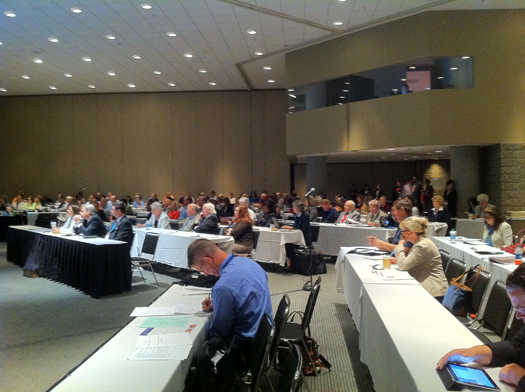
Approximately 200 state lawmakers, staff and advocates from across the country at a child welfare forum at the National Conference of State Legislatures 2013 summit, hosted in Atlanta this week. (Maggie Lee / Youth Today)
ATLANTA — Child welfare services will be much more effective if sub-par parenting is corrected, according to a top researcher. That intervention will also result in better physical health decades into the future. Now, lawmakers are starting to listen and to change rules about combating child neglect and abuse.
“We need to move beyond just an enrichment model,” said Dr. Jack Shonkoff, Center on the Developing Child, Harvard University, Massachusetts, and something of a rock star in the world of early childhood learning and health.
It’s time to do things that add protections for young brains and bodies, he said. Meaning, programs that protect childrens’ developing neural networks, stress response systems and immune systems.

Shonkoff was speaking to people in charge of implementing that new thinking: some 200 state lawmakers, staff and advocates who attended a child welfare forum at the National Conference of State Legislatures 2013 summit, hosted in Atlanta this week. It’s a roughly 5,000-strong gathering that addresses all kinds of state government issues.
For example, Shonkoff said, many low-income mothers suffer from untreated depression. Her depression leads to low-quality interactions with her child. The child’s developing brain expects give-and-take with adults, and if that’s not present, the brain turns on the stress response system.
The physical relics of an overburdened stress response system include greater risk for depression and heart disease, decades into adulthood, as well as interruptions to developing brain circuitry.
But even if the mother gets treatment, the child does not necessarily get better unless her treatment also pays attention to her interactions with her child.
And insurance doesn’t always cover that, which hinders implementing a relatively simple thing to improve the life of a young person.
Thus, the programs with the most impact draw in parents, not just by giving them books and lectures, but by modeling and coaching them to be better parents.
“If you work on skills with parents,” in modeling-type programs, said Shonkoff, “you double pre-reading and pre-math skills.” It’s much more than just leaving books and giving lectures.
Wash. state Rep. Roger Goodman, D-Kirkland, speaking at the same panel, lauded a piece of legislation his state passed last year, creating the Family Assessment Response (FAR) program. It does just what the doctor prescribed.
The so-called FAR targets families that are known to Child Protective Services, but where the children are at a low risk of maltreatment.
FAR “dispatch[es] a therapist into the home to teach parents how to parent better,” said Goodman, of the voluntary program.
The new law comes after a few years of piloting. Both research and evaluation of the project, said Goodman, showed it was the best benefit for the cost.
Just preventing the physical results in adults of childhood neglect or abuse could save “billions” of dollars, Shonkoff said.
A new program from the agency that oversees Georgia’s day cares is focusing on other adults who interact with children.
The Georgia Department of Early Care and Learning (DECAL) has recently started a rating program for day cares that includes grades for health and nutrition programs.
“We know children who are not well, who are sick, do not perform well, do not learn well,” said Bobby Cagle, DECAL commissioner.
Shonkoff said he has no “magic prescription” to improve child welfare, but also said that “science is sitting here waiting to be used for breakthrough thinking.”
Photo of Mr. Shonkoff via Center on the Developing Child, Harvard / http://developingchild.harvard.edu/


























